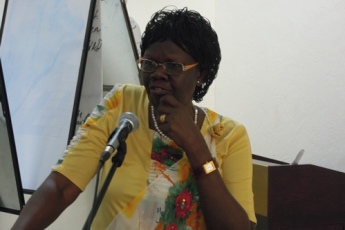UNICEF, Gender ministry to develop child protection strategy
February 16, 2012 (JUBA) — South Sudan’s ministry of gender, child and
social welfare in collaboration with United Nations Children Fund
(UNICEF) on Thursday resolved to develop a framework for strategic
plans on child protection in the country.

held in Juba, the South Sudan capital, as a follow-up of a 2009
assessment conducted by UNICEF on the Juvenile systems in the world’s
newest nation.
Findings of the assessment, carried out in at least six of the 10
South Sudan states, unearthed the poor state of the current juvenile
justice system, which reportedly lacked key protective systems, while
those present did not function properly.
“There is no standardised juvenile justice system operating across
Southern Sudan. Neither are there any community sentence schemes, or
diversion initiatives in operation. There appears to be a dislocation
between the law (both national and international) and its practical
implementation in Southern Sudan,” the UNICEF report reads in part.
The 2009 assessment also cited lack of implementation of the
international human rights principles and South Sudan’s Child Act
2008, which sadly, remain widely unknown across the states as major
setbacks to the juvenile justice sector.
In her remarks during at the workshop closure, Priscilla Nyanyang, the
deputy minister for gender, child and social welfare described the
move to develop a strategic plan as another vital step in efforts to
ensure justice for children in the country.
“The decision you have made to come up with a framework for a
strategic plan for child protection is commendable and extensive
follow-up should be made to ensure its implementation,” said Nyanyang.
She further assured attendees that her ministry was prepared to
include the strategic plan on child protection into that of the gender
ministry, adding that access to justice is an important strategy for
protecting the rights of vulnerable groups including boys, girls and
young people.
In recent years, it has emerged, large numbers of boys and girls in
contact with the law in South Sudan are reportedly socio-economic
victims, denied their rights to education, health, shelter, care, and
protection.
Many of them have had little or no access to education; many are
working children while some of them have left their homes and taken to
the streets to escape from violence and abuse at the hands of their
families.
Hellen Murshale Boro, the gender and social development minister in
South Sudan’s Central state decried the absence of coordination
mechanism to discuss juvenile cases, and advocated for a lead
institution on child protection.
“The Judiciary component on child protection is not active. There are
no children prisons or court, no specialists on child protection and
no institution for social workers in the country. Unless something is
done, we may not achieve or plans on child protection,” she said.
Juba prison alone, according to Boro, has about 49 minors (children
from 6-18 years old at the age of the crime), adding that the ministry
of justice has not yet established a specialized service for children
in conflict with the law, contrary to South Sudan legislation, which
reportedly says children below 14 are not legally responsible for
their acts.
She further advocated for wider dissemination of the Convention on
Rights of the Children as well the provisions of South Sudan Child
Act, 2008. The latter, she said, should be translated from English to
Arabic and other local languages in South Sudan.
(ST)
